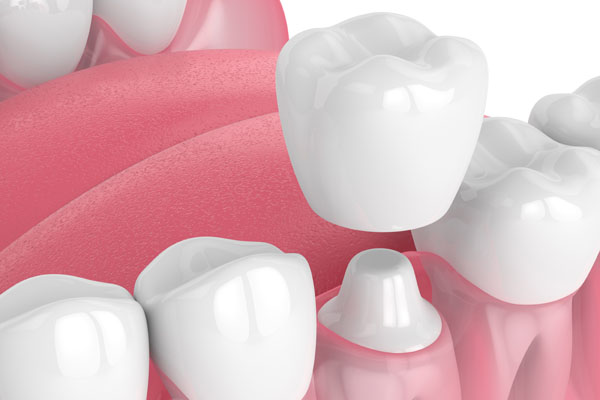Dealing With Dental Crown Issues

A dental crown is an oral prosthetic used to protect a tooth or restore its appearance. Also called a cap, it fully encloses the part of the tooth visible above the gums. It protects the tooth from saliva, bacteria and debris in the mouth.
Dental crowns are one of the most common oral prosthetics, and their many uses include:
- To anchor down a dental bridge
- To protect a broken, fractured or chipped tooth
- To restore the appearance of a badly stained tooth
- To protect teeth after a root canal
- To serve as an artificial tooth in combination with dental implants
Dental crowns can be made from a variety of materials. Porcelain and ceramic are most often used, but crowns can also be made from gold, silver, composites and metal alloys. It typically comes down to what the patient prefers.
When getting a crown, the dentist will usually remove a small portion of enamel to ensure the cap fits snugly. Once installed, crowns do not require specialized maintenance. With good oral hygiene, crowns can last for up to 25 years.
Common dental crown issues
1. Tooth decay
When a patient fails to practice good oral hygiene after getting a dental drown, plaque and tartar can accumulate where the crown meets the tooth. While the crown itself will not be affected by the acids created by the bacteria in plaque, the inner part of the patient's tooth is still prone to decay.
The best way to prevent this is by practicing good oral hygiene. Also, patients should head to the dentist if they notice signs of decay.
2. Discomfort and tooth sensitivity
Some people experience increased sensitivity the first few days after getting a crown installed. This is usually due to the fact that the dentin is exposed when enamel is removed for the crown. The dentist will deal with this sensitivity by applying a solution to the exposed dentin to reduce sensitivity.
3. Loose crown
Eating certain foods and decay can lead to a crown becoming loose. When this happens, patients should head to the dentist's clinic. A loose crown means the enclosed tooth is no longer being protected from irritants in the mouth. Dental cement can be used to reattach a loose crown.
4. Fractures and chips
While crowns are extremely durable, they are not as tough as real teeth. Patients should keep that in mind when chewing and avoid hard foods that can damage the crown. If the crown ends up becoming chipped, composite resin can be used to restore its appearance. If it is badly damaged, the patient might need to get a replacement.
5. Irritated nerves
The nerve in the pulp chamber of a tooth can easily become irritated when a crown is being installed. This often leads to discomfort and sometimes, severe pain. At times, it can take months for the symptoms to show up.
The best way to deal with this issue is to have the nerve removed with a root canal and get a new crown.
Contact one of our dentists to learn more about dealing with crown issues.
Here's what you need …
Request an appointment here: https://gkdentaloffice.com or call GK Dental PC at (617) 826-6075 for an appointment in our Everett office.
Check out what others are saying about our services on Yelp: Read our Yelp reviews.
Recent Posts
Dental restorations have been used for thousands of years. In fact, a 2012 article published by The New York Times details the discovery of a 6,500-year-old human jawbone. Considered the earliest evidence of dental fillings, it had beeswax in one tooth, which researchers believe was to ease the pain of a crack. These days, restorations…
Crowns are commonly used in dental restorations. A crown is a cap shaped like a tooth but hollow in the middle. It fits over a natural tooth that has to be prepared first. Depending on the issue it is correcting, a crown can be used by itself or as a component of another restoration technique.Teeth…
Regular dental checkups are vital to keeping your teeth and gums healthy. You should visit your family dentist at least once every six months. This includes both adults and children alike. Routine dental appointments are essential for good oral health and they offer many important benefits.Tartar removal is an important step in dental appointments that…
Restorative dentistry refers to any type of dental procedure that a dentist performs to restore a damaged or missing tooth. Dental restorations can encompass several procedures that vary in terms of invasiveness, complexity, and what they can accomplish. However, the overreaching goal of all restorative procedures is to improve the health, function, and appearance of…


